Data management platforms (DMP) are continuing to grow in popularity. Some experts project compound annual growth rates for the global DMP market to exceed 11% by 2025.
Enterprise data management is an industry-agnostic issue. In response to this, we’ve conducted research and pulled from our expertise to compile the top data management systems on the market today as well as their individual benefits.
What is a Data Management Platform?
A data management platform is a tool used in different industry verticals to aggregate, store, and analyze data from a multitude of sources. Sources can be in-house or through third parties.
The growth of DMPs is a direct result of enterprises developing big data strategies in the 21st century. The sheer volume, velocity, and variety of data sets enterprises have grown accustomed to are made viable through DMPs.
The primary use cases for DMPs, no matter the industry, include:
- Segmenting and scaling audiences
- Analyzing audience and behavioral data
- Customer acquisition
Also read: Simplifying Data Management with Hybrid Networks
What Are the Benefits of a Data Management Platform?
The best data management platforms provide enterprises with the following benefits:
- Consolidating large data sets in one platform
- Increasing overall revenue
- Integrating second and third-party data to analyze new markets
- Building more targeted marketing campaigns
- Segmenting customers and audience sets
- Increasing content value
Best Data Management Platforms
Here are six leaders in the market to consider. We’ve provided key features, pros and cons, as well as pricing for a high-level overview of each vendor.
Adobe Audience Manager
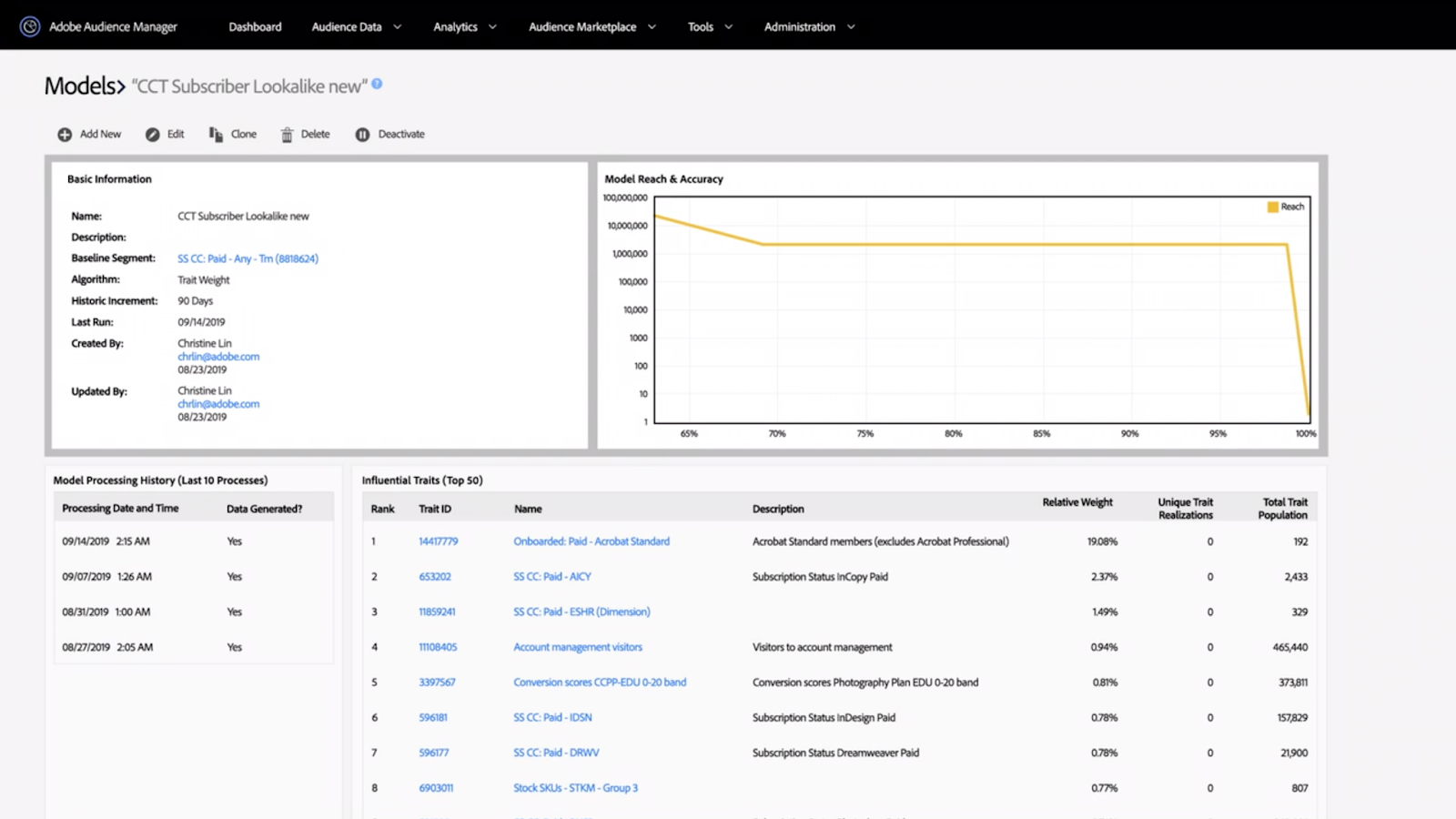
Although Adobe is best known for its design software, its Audience Manager is a powerful business solution. Organizations such as Hyatt, Virgin Holidays, and Sky have all utilized Audience Manager to consolidate data, segment audiences, and analyze new insights.
This platform is just a piece of Adobe’s Experience Cloud package. The kit of software tools helps enterprises complete e-signatures, complete end-to-end user journeys, and scale AI-driven marketing campaigns. The fact that Audience Manager integrates seamlessly with these solutions is its differentiating factor for enterprises.
Key Features:
- A/B test segmentation
- Bi-directional, real-time data integration with Adobe Analytics
- First-party audience data transfer
- Algorithmic modeling for predictive audience analysis
- Organization ID
Pros:
- It integrates seamlessly with Adobe Experience Cloud software
- Customers report that the software is user-friendly
- It is cloud-based and easy to access
Cons:
- Load times for data are rather long
- Customers commonly complain about pricing
- The solution comes with a steep learning curve
Pricing: Adobe does not share pricing plans for Audience Manager with the public. Businesses must contact Adobe directly for a quote based on their needs and company size.
Oracle BlueKai
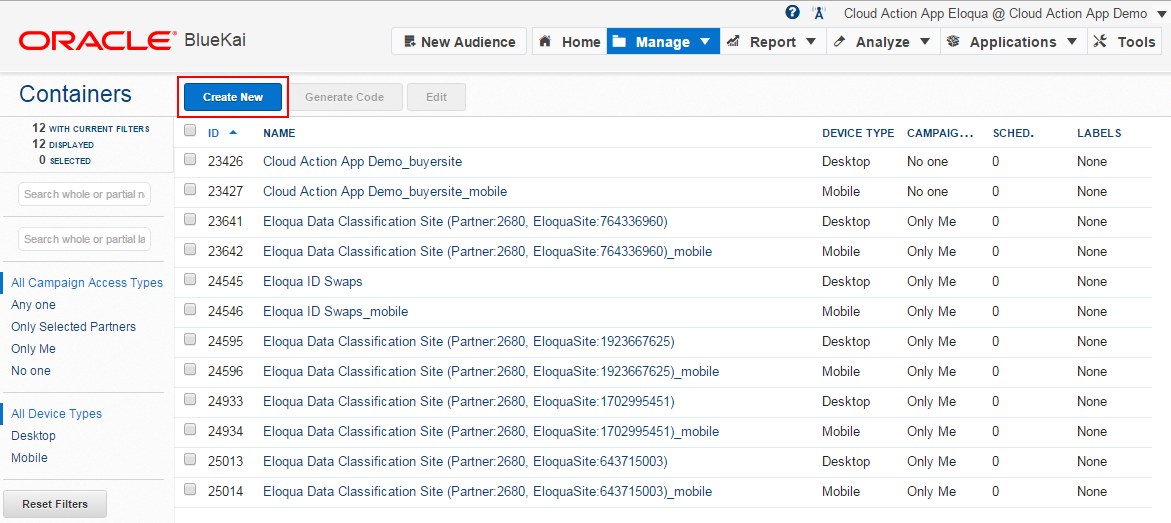
When tech giant Oracle purchased BlueKai for an estimated $400 million in 2014, it instantly became a leader in the DMP market. Six years later, Oracle BlueKai is now an essential component of Oracle’s CX Marketing lineup of solutions. One of its driving factors for enterprises is its ability to engage ready-to-buy customers.
What’s most striking about Oracle BlueKai is the team’s approach to marketing and ad-purchasing. Workers often conduct reports and post insights on the future of data management and customer acquisition, providing customers with a top-level view of various industry verticals. That perspective is no doubt helpful for the company’s enterprise customers, including Duracell, JetBlue, and Dow Jones.
Key Features:
- Advertising data integration
- Taxonomy and classification permission tools
- Unique ID via Oracle ID Graph
- Audience analytics reporting
- Post-campaign analysis
Pros:
- Is equipped with over 200 integrations
- Customers can access offline data with the solution
- It natively integrates with Oracle ID Graph for third-party data access
Cons:
- The solution is primarily a B2C tool with limited B2B capabilities
- Usability and interface clunkiness are common pain points among users
- Because it is part of a larger package, deployment is more difficult
Pricing: The Oracle CX Marketing bundle starts at $2,000 per month for up to 10 users.
Nielsen Marketing Cloud
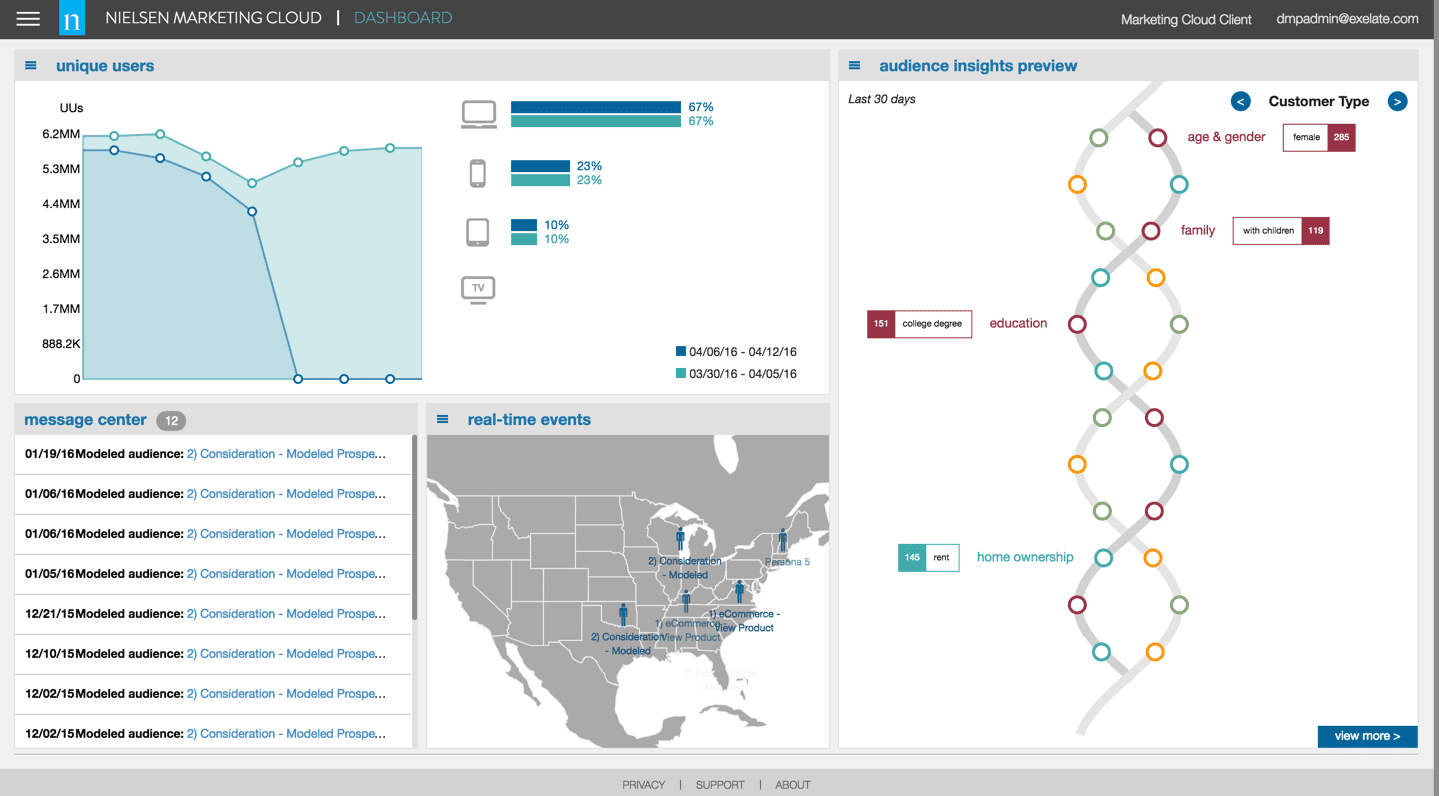
Nielsen Holdings Inc. is best known for the Nielsen TV ratings, a standard in audience measurement. It’s only right that one of the largest marketing measurement companies in the world has a proprietary DMP. Nielsen Marketing Cloud’s biggest differentiator is its integration with actual Nielsen audience data.
For additional context into just how rich that data set is, consider the fact that Nielsen operates in over 90 countries. Throughout those 90 countries, the conglomerate covers more than 90% of the global population. That plethora of data proves useful, especially when considering that Nielsen Marketing Cloud had some of the best reviews we came across in our research.
Key Features:
- Real-time consumer engagement analytics
- Content marketing, creative testing, search, and social media integrations
- Nielsen AI audience behavior models
- Marketing ROI analysis
- Programmatic purchasing
Pros:
- It pulls from authorized Niesel audience data, a robust data set
- The R&D 100 Award committee has recognized the solution as an innovative product
- It utilizes AI and ML more than its competitors
Cons:
- Although Nielsen audience data is available, some users report feeling restricted in exploring other data sets
- The solution comes with a steep learning curve
- Users also report performance issues regarding load times
Pricing: Nielsen does not share pricing plans for Marketing Cloud with the public. Businesses must contact Nielsen directly for a quote based on their needs, desired features, and company size.
The Trade Desk
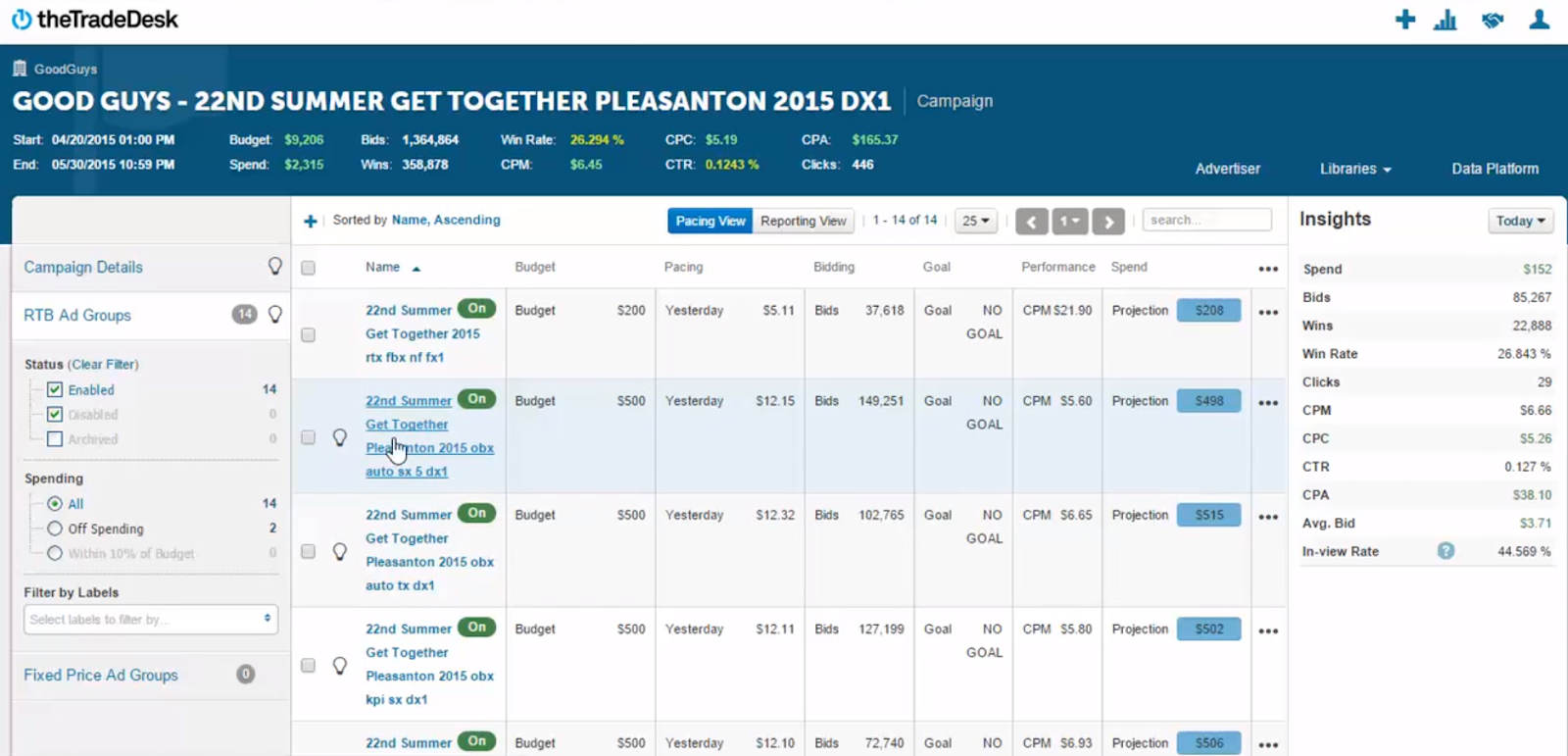
Since its founding in 2009, The Trade Desk Inc. has served as a global leader for digital ad buyers looking to run data-driven advertisements. The company’s ethos is a major factor behind its multitude of industry-titan partners, including ABC, Viacom, and The Wall Street Journal.
Iteration is at the forefront of company operations. The platform itself recently went through a redesign, bringing along a more user-friendly interface. With this change comes the company’s proprietary AI engine: Koa. The Trade Desk leverages these new changes to set enterprise campaign goals, set KPIs, and achieve these points more efficiently than competitors.
Key Features:
- Real-time consumer engagement analytics
- Content marketing, creative testing, search, and social media integrations
- Nielsen AI audience behavior models
- Marketing ROI analysis
- Programmatic purchasing
Pros:
- This DMP comes with a diverse selection of data to pull from
- Customers claim campaign reporting is seamless in both setup and presentation
- Users are provided a Unified ID which makes tracking more efficient
Cons:
- Although reporting is easy to run, users report a lack of granularity
- Customer support can be slow at times
- New users report difficulties in learning the software
Pricing: The Trade Desk does not share pricing plans for its DMP with the public. Businesses must contact The Trade Desk directly for a quote based on their needs, desired features, and company size.
Google Marketing Platform
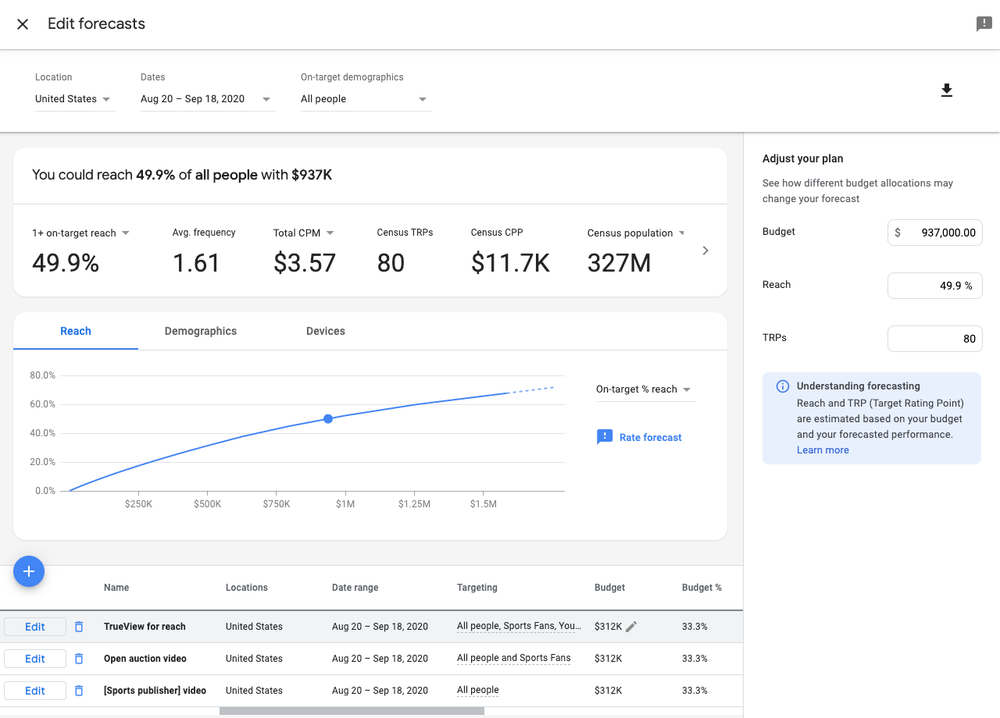
There is no sign of Google slowing down. Just last year, the company’s advertising business saw over a 43% increase in revenue in Q3 of 2021 alone. This is due to the continual growth of Google Marketing Platform, Google’s online advertising platform aimed primarily for enterprises and large advertisers.
Note that of this entire list, this DMP is the only one that offers complimentary features. Google Analytics, Data Studio, Optimize, Surveys, and Tag Manager are all viable solutions to jumpstart an enterprise’s purchasing journey with Google’s DMP. Businesses can then purchase Google’s more advanced 360 line of products, all of which help run digital media campaigns and gain real-time insight into customer behavior.
Key Features:
- Real-time consumer engagement analytics
- Cross device capabilities
- Google Cloud integrations
- ML powered campaigns via Smart Campaigns
- Programmatic ad optimization
Pros:
- The DMP is very convenient for enterprises that do much of their advertising on Google
- Users can choose various Marketing Platform products to purchase rather than buying an entire bundle
- It takes full advantage of Google’s web data and analytics capabilities
Cons:
- Integrations with third-party sources are rather lackluster
- Users in developing countries claim that the service is limited in support for their market
- Channel management features are reportedly stronger in alternative platforms
Pricing: Google does not share pricing plans for its Marketing Platform package with the public. Its Campaign Manager 360, Display & Video 360, Search Ads 360, and Analytics 360 modules all have separate costs.
Businesses must contact Google directly for a quote based on their needs, desired features, and company size.
Mapp Cloud
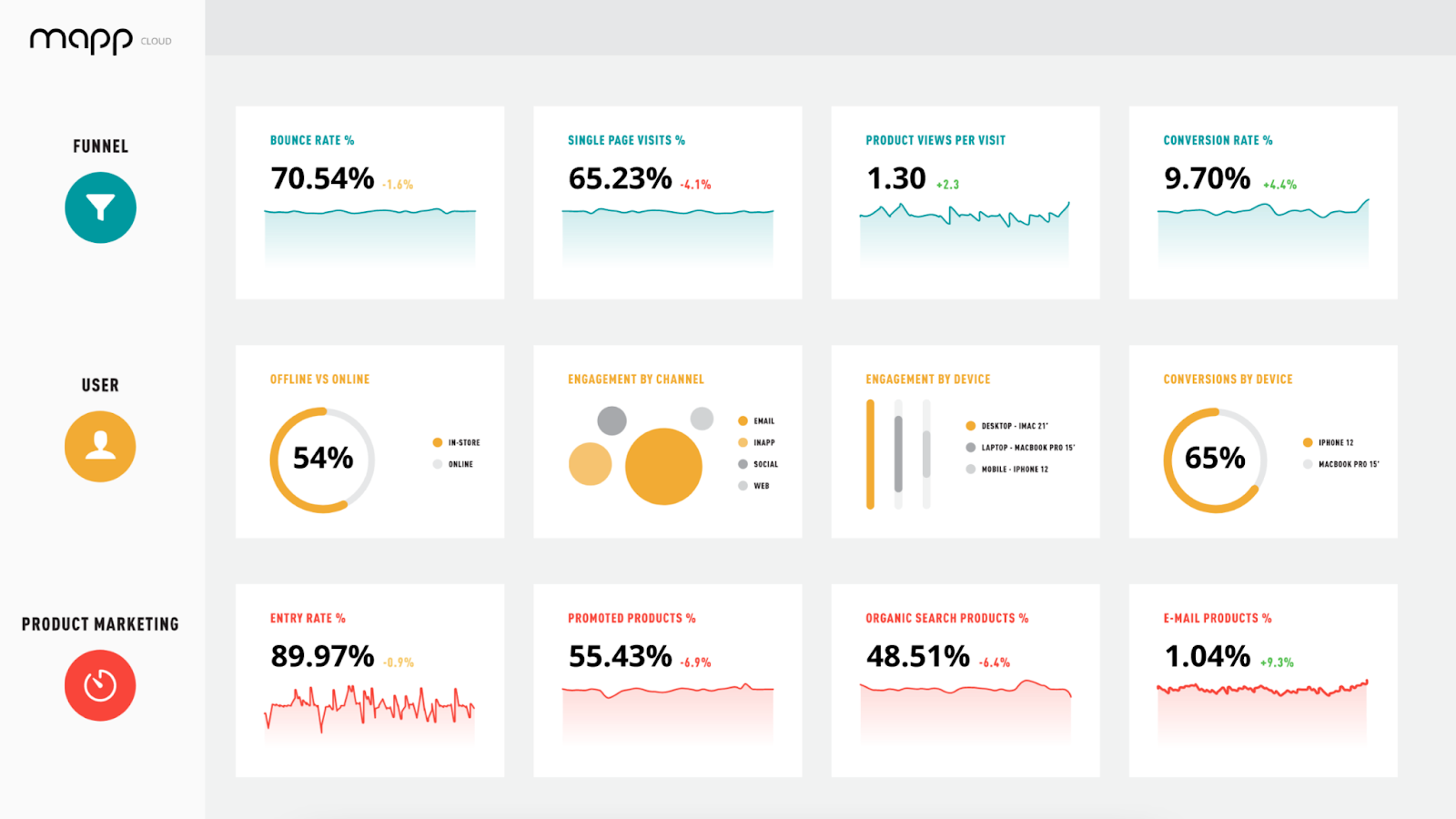
Mapp Cloud, formerly known as Mapp Digital, is one of the oldest players on this list. Founded in 1998, its legacy standing and reputation are well deserved. With customers like CBS, Unilever, and Pepsico, Mapp Cloud is a tried and true DMP that helps enterprises with customer acquisition and engagement.
The company’s main selling point is its “insight-led” approach to digital marketing. This approach helps enterprises combine data with AI to produce real-time insights and connect them with consumers. This helps enterprises connect with customer data throughout different points of the user journey rather than just a pocket of time. Mapp also offers extensive integration support for CRMs, DSPs, and eCommerce tools, all of which come with onboarding and installation support.
Key Features:
- Cross-channel marketing execution
- Predictions, recommendations, and churn prevention
- Predictive customer behavior and insights
- Real-time, unified customer profiles
- ROI analytics
Pros:
- The customer service team is quick to respond and proactive in problem-solving
- It integrates with a variety of third-party tools like Amazon Advertising and Instagram
- It offers solutions specifically designed for different industry verticals, including retail, finance, and agencies
Cons:
- Some users report its email marketing and HTML creators occasionally suffer from bugs
- The interface is not as user-friendly as its competitors
- Complaints about its social media and SMS capabilities are common
Pricing: Mapp does not share pricing plans for Mapp Cloud with the public. Businesses must contact Mapp directly for a quote based on their needs, desired features, and company size.
Read next: Top 8 Data & Data Analytics Trends for 2022
The post Best Data Management Platforms (DMP) 2021 appeared first on Enterprise Networking Planet.

